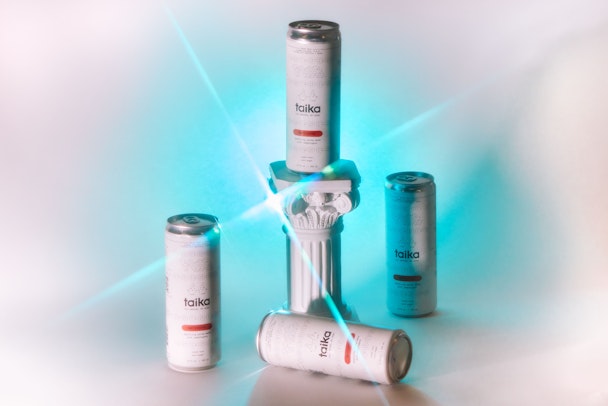How energy drink brand Taika partnered with a DAO to launch ‘Mateverse’
The emerging energy drink brand partnered with a DAO to develop its new sparkling mate beverage. Welcome to the world of web3-based marketing.

Taika launched ‘Mateverse’ in September, after developing the product in partnership with a DAO / Taika
Since its inception, Taika has been going against the grain of the energy drink industry by developing sugar-free beverages geared towards creativity over teeth-grinding energy. (One of the taglines on its website is: ‘Coffee that makes you feel inspired, not wired.’) Now the company is flipping traditional R&D on its head by turning to web3.
While many leading energy drink brands market themselves primarily to extreme athletes (think Monster and Rockstar) or gym rats (think Celsius and C4), Taika has taken aim at an audience that’s looking to enjoy the benefits of caffeine without the jitters; people who might want to enjoy a productive workday without feeling like they’ve popped an Adderall. And whereas many of the big-name energy drinks are jam-packed with sugar, all of Taika’s products contain no added sugar.
Taika – Finnish for “magic” – has dubbed itself a “creative energy” beverage. This niche, according to Michael Sharon, Taika’s co-founder and chief executive, is comprised of “people that are looking for something better for their bodies, better for their minds and overall better feeling.”
Advertisement
Sharon and his co-founder Kal Freese – an entrepreneur with a background in the coffee industry – launched Taika in the spring of 2020, as the world slowly became clenched in the grip of lockdown. They had begun to implement a business model that Sharon calls direct-to-business, or D2B, in which they would send products to their friends’ office spaces in the San Francisco area. They enjoyed some success with D2B, but eventually, of course, all of those businesses soon went remote and they had to abandon the model.
The brand turned to web3 for the recent launch of Mateverse, a sparkling yerba mate beverage with 60mg caffeine (a bit more than is found in a typical cup of Earl Gray). It contains a slew of trendy adaptogens, nootropics and mushroom extracts, any one of which would have been virtually unheard of to the average American just a few years ago, but now can be found in abundance in almost every Whole Foods and, increasingly, in some of the more hipster cafes.
Coca-Cola recently made the stunt-laden claim of having created a pixel-flavored soda, but no, Taika isn’t marketing Mateverse as a metaverse-flavored drink.
Hooking up with Friends With Benefits
Before releasing it to the public, Sharon and Freese turned to Friends With Benefits (FWB), a decentralized autonomous organization (DAO) that describes itself as “a decentralized creative studio, and a never-ending group chat.” It uses its own cryptocurrency, $FWB.
Advertisement
Hundreds of FWB community members participated in a vote to choose the packaging for Mateverse. After a design was chosen, Taika released a Mateverse NFT to grow a community around what was quickly becoming a collaborative R&D project. The brand sent two flavors – nicknamed the “red pill” and the “blue pill” – to token-holders, who were asked to select their favorite. The winner of that vote is the product that was released to the public in September.
“This is the first time I think anybody has ever collaborated with a DAO to make products,” Sharon says. Mateverse is now described on Taika’s website as “The official beverage of FWB.”
Freese adds that though this kind of virtual, distributed focus group might seem radical to larger companies, it aligns nicely with Taika’s core ethos. “That’s not something that P&G would ever do – give a group of people the final say on which formulation should go in the market – but for us it was kind of obvious because we’re building it for the community, by the community.”
As many people who have launched successful web3-based campaigns will tell you, authenticity (a willingness to actually directly participate in and collaborate with the web3 community you’re looking to build in) has been key to Taika’s ability to launch Mateverse. “We didn’t want to do something in web3 just to do something in web3,” Freese says. “That’s a recipe for pretty mediocre collaborations, like some bigger CPG brands try to do ... many brands see that there’s an opportunity to do something without really taking the time to be part of the space and understand how it works. It’s hard to do something authentic if you don’t really involve yourself in this space.”
Suggested newsletters for you
For more, sign up for The Drum’s Inside the Metaverse weekly newsletter here.

